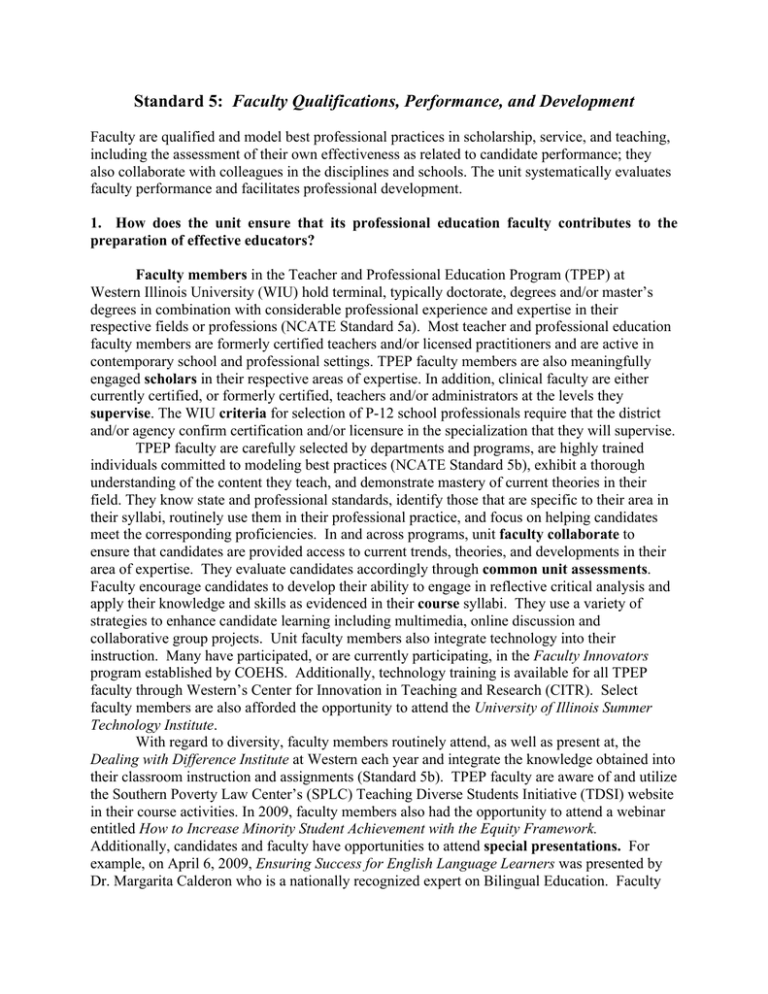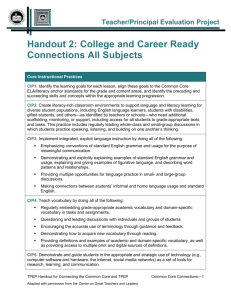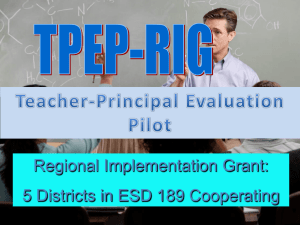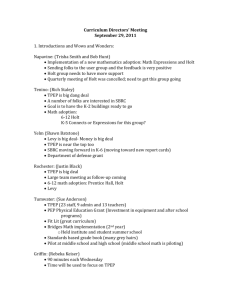Faculty Qualifications, Performance, and Development
advertisement

Standard 5: Faculty Qualifications, Performance, and Development Faculty are qualified and model best professional practices in scholarship, service, and teaching, including the assessment of their own effectiveness as related to candidate performance; they also collaborate with colleagues in the disciplines and schools. The unit systematically evaluates faculty performance and facilitates professional development. 1. How does the unit ensure that its professional education faculty contributes to the preparation of effective educators? Faculty members in the Teacher and Professional Education Program (TPEP) at Western Illinois University (WIU) hold terminal, typically doctorate, degrees and/or master’s degrees in combination with considerable professional experience and expertise in their respective fields or professions (NCATE Standard 5a). Most teacher and professional education faculty members are formerly certified teachers and/or licensed practitioners and are active in contemporary school and professional settings. TPEP faculty members are also meaningfully engaged scholars in their respective areas of expertise. In addition, clinical faculty are either currently certified, or formerly certified, teachers and/or administrators at the levels they supervise. The WIU criteria for selection of P-12 school professionals require that the district and/or agency confirm certification and/or licensure in the specialization that they will supervise. TPEP faculty are carefully selected by departments and programs, are highly trained individuals committed to modeling best practices (NCATE Standard 5b), exhibit a thorough understanding of the content they teach, and demonstrate mastery of current theories in their field. They know state and professional standards, identify those that are specific to their area in their syllabi, routinely use them in their professional practice, and focus on helping candidates meet the corresponding proficiencies. In and across programs, unit faculty collaborate to ensure that candidates are provided access to current trends, theories, and developments in their area of expertise. They evaluate candidates accordingly through common unit assessments. Faculty encourage candidates to develop their ability to engage in reflective critical analysis and apply their knowledge and skills as evidenced in their course syllabi. They use a variety of strategies to enhance candidate learning including multimedia, online discussion and collaborative group projects. Unit faculty members also integrate technology into their instruction. Many have participated, or are currently participating, in the Faculty Innovators program established by COEHS. Additionally, technology training is available for all TPEP faculty through Western’s Center for Innovation in Teaching and Research (CITR). Select faculty members are also afforded the opportunity to attend the University of Illinois Summer Technology Institute. With regard to diversity, faculty members routinely attend, as well as present at, the Dealing with Difference Institute at Western each year and integrate the knowledge obtained into their classroom instruction and assignments (Standard 5b). TPEP faculty are aware of and utilize the Southern Poverty Law Center’s (SPLC) Teaching Diverse Students Initiative (TDSI) website in their course activities. In 2009, faculty members also had the opportunity to attend a webinar entitled How to Increase Minority Student Achievement with the Equity Framework. Additionally, candidates and faculty have opportunities to attend special presentations. For example, on April 6, 2009, Ensuring Success for English Language Learners was presented by Dr. Margarita Calderon who is a nationally recognized expert on Bilingual Education. Faculty are strongly encouraged to utilize knowledge gained from these presentations in their professional practice. While the systematic evaluation of effectiveness in teaching is included in WIU’s promotion, retention and tenure process; many instructors go beyond required assessments to obtain student feedback regarding the effectiveness of their teaching (Standard 5b). Furthermore, faculty members in the unit are routinely recognized as outstanding teachers. Recent winners of the Awards in Excellence in Teaching, Teaching with Technology, and Multicultural Teaching at both the College and University levels include J. Q. Adams, John Cooper, Leaunda Hemphill, Mary Jensen, James LaPrad, and James West. Dr. J. Q. Adams, professor in Educational and Interdisciplinary Studies, was also selected as the WIU Distinguished Faculty Lecturer for 2011. In addition, Andy Baker, Agricultural Education, was recently recognized as a 2010 Distinguished Teacher at the American Association for Agricultural Education (AAAE). Also, James LaPrad, associate professor in Educational and Interdisciplinary Studies, received the National Society for Experiential Education (NSEE) 2008 Experiential Education Higher Education Leader of the Year Award. These awards are indicative of the importance placed on quality teaching by both faculty and administrators in the university. Scholarship is a specific focus of the Unit and the University and reflects their respective missions (Standard 5c). With an increased emphasis on scholarly productivity, the Unit is supporting and rewarding scholarly presentations and publications through a variety of initiatives. For example, COEHS recently established the Faculty Scholars program and the annual COEHS Faculty Scholars Lecture. In connection with the Unit and University’s mission, for the past two years members of TPEP and the NCATE Steering Committee have shared the work undertaken in strengthening the Teacher and Professional Education Unit at Western with their professional colleagues at the annual AACTE conference. Another example of mission focused scholarship is Dr. Kathy Barclay’s recently published work Together We Can: Uniting Families, Schools, and Communities to Help All Children Learn. TPEP faculty, in collaboration with their candidates, regularly participate in the University’s Undergraduate Research Day (Standard 5c). In addition, the COEHS also recently established COEHS Graduate Research Symposium where graduate students, and recent graduates, and their mentors in the college have the opportunity to showcase their research to the University community during the annual COEHS week. Finally, the Dean’s office instituted a program in 2009 whereby faculty members with a strong scholarly focus could apply for funding for a dedicated graduate assistant to help them with their research. In the arena of service (Standard 5d), TPEP faculty are actively involved in: (1) the professional world of P-12 practice, (2) their professional associations, and (3) education-related services at a variety of levels. Examples of faculty engagement in the professional world of P-12 practice include providing staff development activities in local schools, such as assisting with test preparation and providing ELL seminars. These faculty activities exemplify and model for their candidates the professional practices and commitment to service in support of students, schools and communities that the Unit desires candidates to adopt as they move toward integration into the professional community. Examples of faculty involvement in professional organizations include membership on the AACTE Research and Dissemination Committee and editorial board of Journal of Teacher Education, collaboration on ISBE Advisory Groups in developing States Standards, and holding various leadership positions in regional professional organizations. Examples of faculty providing education-related services include collaboration on diversity initiatives with regional school districts and working with local teachers to enhance their math and science instruction. The Faculty Qualifications table reveals the full nature and extent of these activities. As noted above, WIU’s promotion, retention and tenure process supports systematic evaluation of effectiveness in teaching (Standard 5e). Tenure-track faculty members are systematically evaluated each academic year in accordance with contract stipulations and departmental criteria in the areas of Teaching/Primary Duties, Scholarly/Professional Activities, and Service Activities. Tenured faculty members submit an annual summary of their intellectual activities and are reviewed every four years in the same three areas. TPEP faculty are encouraged to routinely participate in professional development activities (Standard 5f). Some examples of these activities include the monthly Continuing Conversations colloquium series, the annual back-to-school TPEP faculty retreats, Faculty Innovators Program, CITR training, IACTE conferences on current topics such as RTI and ELL, numerous web conferences related to current educational issues, and local, regional, and national conferences offered by professional organizations. 2. Briefly summarize the most significant changes related to Standard 5 that have led to continuous improvement. Several changes related to NCATE Standard 5 have moved the Unit in the direction of continuing improvement. The redesign of WIU’s TPEP Conceptual Framework has facilitated collaboration across the unit’s disciplines, programs and P-12 school partners. With the university’s renegotiated contract and Professional Achievement Award (PAA), the unit was able to reward program faculty for increased levels of professional engagement and development. Other notable changes include a movement toward greater collaboration and integration across the unit. For example, professional education faculty meet annually to examine and promote curriculum integration across programs. Up to this point, three Unit wide faculty retreats have been conducted. The first focused on the revised conceptual framework. This was followed by the presentation of the revised unit wide Western Teacher Work Sample (WTWS) as the capstone evaluation of teacher candidates. The third retreat focused on the development of the novice to expert model as a framework for professional preparation for unit candidates. We also established the Continuing Conversations colloquium series and corresponding blog where unit faculty share their expertise with other members of the Teacher and Professional Education community. As a result of these initiatives, the Unit now operates and collaborates with a focused framework that views teacher candidates as developing experts. The College of Education and Human Services and the Provost’s office has supported professional development by virtue of establishing annual travel awards for faculty presenting at professional conferences. Additionally, COEHS established a Faculty Scholars program, the annual COEHS Faculty Scholars Lecture, and annual Graduate Research Event.



